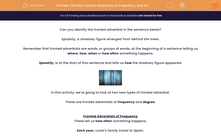Can you identify the fronted adverbial in the sentence below?
Spookily, a shadowy figure emerged from behind the trees.
Remember that fronted adverbials are words, or groups of words, at the beginning of a sentence telling us where, how, when or how often something happens.
Spookily, is at the start of this sentence and tells us how the shadowy figure appeared.

In this activity, we’re going to look at two new types of fronted adverbial.
These are fronted adverbials of frequency and degree.
Fronted Adverbials of Frequency
These tell us how often something happens.
Each year, Louie’s family travel to Spain.
Each year tells us how often they go to Spain.

Remember we always put a comma after a fronted adverbial.
Here are some other fronted adverbials of frequency:
Often
Every day,
Regularly,
Never before,
Frequently,
Can you make up a sentence using a fronted adverbial of frequency?
How about this one?
Never before, had it snowed in the city of Cairo.

Adverbials of Degree
Adverbials of degree are words, or groups of words, telling us the intensity of something or how much something happens.
Can you see the fronted adverbial of degree in the sentence below?
Completely exhausted, Zak collapsed on his bed.
Completely exhausted tells us the degree to which (how much) Zak was exhausted.

Here are some other fronted adverbials of degree:
Obviously excited,
Really upset,
Totally angry,

The words obviously, really and totally help us to understand how excited, upset or angry the characters in a story are.
We could replace the words excited, upset and angry with other words to help us in our writing.
Can you make up a sentence beginning with one of these fronted adverbials of degree?
How about this one?
Really upset, the losing team dragged their feet off the pitch.
In this activity, you’ll be on the hunt for fronted adverbials of frequency and degree. Remember those commas!







